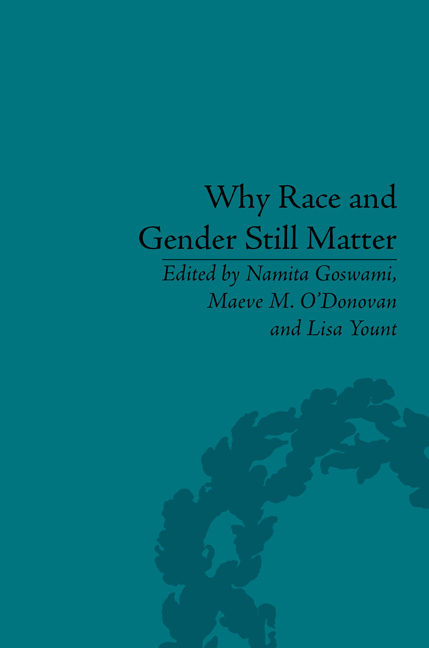Book contents
- Frontmatter
- CONTENTS
- Dedication
- Acknowledgements
- List of Contributors
- Introduction to Why Race and Gender Still Matter: An Intersectional Analysis
- Part I Defining Intersectionality
- Part II Doing Intersectionality
- 6 Continental Feminist Philosophy Meets Intersectionality: Rosi Braidotti's Work
- 7 Purposeful Nonsense, Intersectionality and the Mission to Save Black Babies
- 8 Transitional Subjects: Gender, Race and the Biopolitics of the Real
- 9 Caster Semenya: Reasoning Up Front with Race
- 10 Philosophical Happiness and the Relational Production of Philosophical Space
- 11 Theory Can Heal: Constructing an Ethos of Intervention
- Notes
- Index
8 - Transitional Subjects: Gender, Race and the Biopolitics of the Real
from Part II - Doing Intersectionality
- Frontmatter
- CONTENTS
- Dedication
- Acknowledgements
- List of Contributors
- Introduction to Why Race and Gender Still Matter: An Intersectional Analysis
- Part I Defining Intersectionality
- Part II Doing Intersectionality
- 6 Continental Feminist Philosophy Meets Intersectionality: Rosi Braidotti's Work
- 7 Purposeful Nonsense, Intersectionality and the Mission to Save Black Babies
- 8 Transitional Subjects: Gender, Race and the Biopolitics of the Real
- 9 Caster Semenya: Reasoning Up Front with Race
- 10 Philosophical Happiness and the Relational Production of Philosophical Space
- 11 Theory Can Heal: Constructing an Ethos of Intervention
- Notes
- Index
Summary
In recent years, numerous scholars have noted the fraught history between feminist, queer and transgender theory. In the present essay, I focus one on strand of this history, which is concerned with claims to a real body or a real identity. The use of the language of the real, in transgender accounts of embodiment and identity, has historically come into tension with feminist and queer philosophical accounts of the discursiveness and constructedness of bodies and identities. Claims to a real gender identity, for example – as in the claim to ‘really be’ a man or a woman – have been undercut by critiques of naturalized identity categories, while body modification practices, such as hormone use and surgeries, have been criticized by some feminists as upholding essentializing ideas about the relationship between gender identity and bodily morphology. As the emerging field of transgender studies has called for new conceptual frameworks, queer and feminist theory has simultaneously been beset by questions of race and nationality – the whiteness of these fields has been repeatedly questioned and challenged.
My aim here is not to revisit these debates but to examine how recent work in transgender studies disrupts the linkage between queer feminist theory, transgender and critical race challenges to such theorizing, and Michel Foucault's account of disciplinary power.
- Type
- Chapter
- Information
- Why Race and Gender Still MatterAn Intersectional Approach, pp. 117 - 132Publisher: Pickering & ChattoFirst published in: 2014



